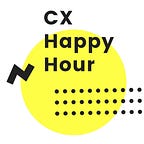Cheers, Sean Hua
This week, we are catching up with Sean Hua. Sean is a senior experience designer at Aurecon in Melbourne. Those of you who have met Sean will know him as a super friendly, proactive, deeply analytical thinker and clear communicator who is always keen to collaborate on new projects.
Sean has previously held roles at World Vision and a few recent freelance gigs, working with Code for Australia on a data visualisation tool that tracks politicians’ voting history on climate change, as well as some new circular economy initiatives over in Western Australia.
First things first, what are we drinking?
Long Beach Dreamsicle, a Nordic Hazy IPA by Urban Alley.
Cheers to that!
What’s your design super power, or secret weapon?
Listening to people’s needs, addressing them and creating a safe space for designers. I feel my personal strength is supporting other designers more so than being a designer — I’m good at the process and operational side of things to enable designers to do their work.
I recently worked with a team full of designers, with no set way of working, no set way on how we store files online. This caused issues for the team around communication and transparency. We started a designers only safe space to talk about our frustrations and found that most of our challenges stemmed from process-based issues. I worked to fix some of these items in my own time and that led to a bit more breathing room for designers to do what they do best.
What do you do to inspire creativity, or for getting un-stuck?
Tea solves most problems. When I watch tea beginning to steep and swirl colours in my teapot, in that moment I wind into my day.
I also try as often as I can to take an opposing view to an opinion I hold. When I ask myself how I can get to that opposing view, it often leads to a lot of other perspectives from which to view the issue I’m stuck on.
How did you get into design?
I’ve always sort of been in the design field, previously my focus was on buildings and cities. My transition from Urban Design into SD/CX/XC/HCD etc. was a combination of luck and intent. I was lucky (in hindsight) to be embroiled in workplace politics that freed up a lot of my time, and thankful that another colleague was asking questions about our organisations tech capabilities.
That scenario became an opportunity to explore how we could use our time to make our tech work better for our staff, and also see if that had benefits for our customers. It did. I had wanted to steer my career into a greater tech-centric area somehow, and I enjoyed the process so sought to make that a more permanent professional move and made the jump to service design.
What’s the most important lesson you’ve learnt as a designer?
I don’t think it’s just for designers, never stop asking “why?”
I moved to Australia at 16 and was back visiting my family a few months later. I spotted my old rugby coach hustling from A to B. He asked what I thought of Australia, and then said…
“Are you happy there? It’s the only question that matters.”
I now ask that question of myself often.
What is a challenge you think all designers need to face into with our work?
A question I’ve recently asked myself and others, does this actually bring about systemic change?
Does your organisation truly value what you do? Do they understand what you can contribute? Is the work that you are doing really making a difference?
At the moment, I’m looking at accessibility needs on public transport. I have good people around me who are pushing really hard to get all voices heard and considered. We’re doing our best, so let’s see what materialises on the ground!
On a broader level, when we look back at 2020 and all the issues we have faced, in a variety of ways whether it’s our healthcare response, welfare system, or our support of local economies… All of these events have faced a huge disruption and the systems that were in place played a part in that disruption. I won’t say they are flawed, but there are issues within these systems — so is the work that we are doing addressing those issues? That’s a question that should be kept in mind.
What are you currently learning or exploring?
I’m digging into new topics on the regular since… [drum roll]… I’m going to co-host a podcast via Code for Australia! As every episode will have new guests and a new topic, there’s constant learning opportunities which I love. Stay tuned, we’ll be releasing episodes shortly!
What are you looking forward to?
This coming decade might suck a little bit, but it gives us the environment to really try and change a lot of the ways our society currently operates and that’s something to be really optimistic about, hopefully into the 2030s.
I know you love a good podcast, any recommendations?
I’m on a roll with macroeconomic and geopolitical podcasts at the moment.
I would recommend, for its accessibility, the Hidden Forces podcast, the host is very widely read, has a huge variety of guests and endeavours to break down their thoughts simply.
